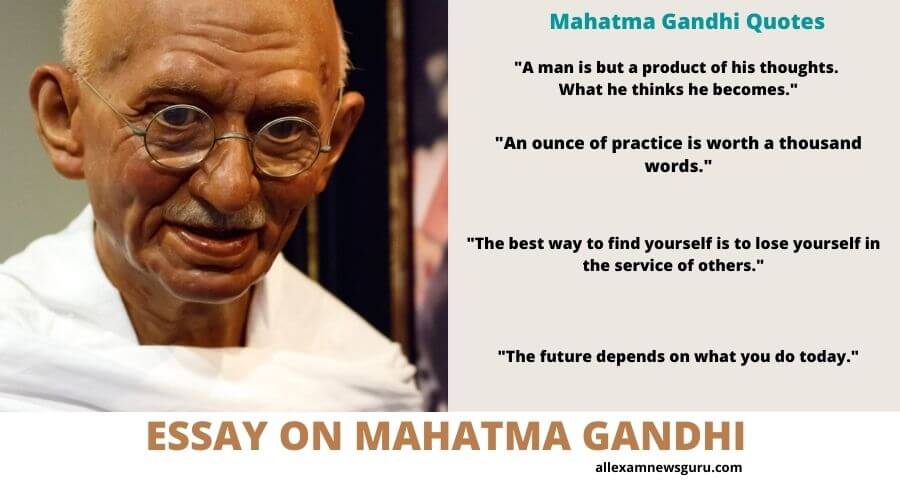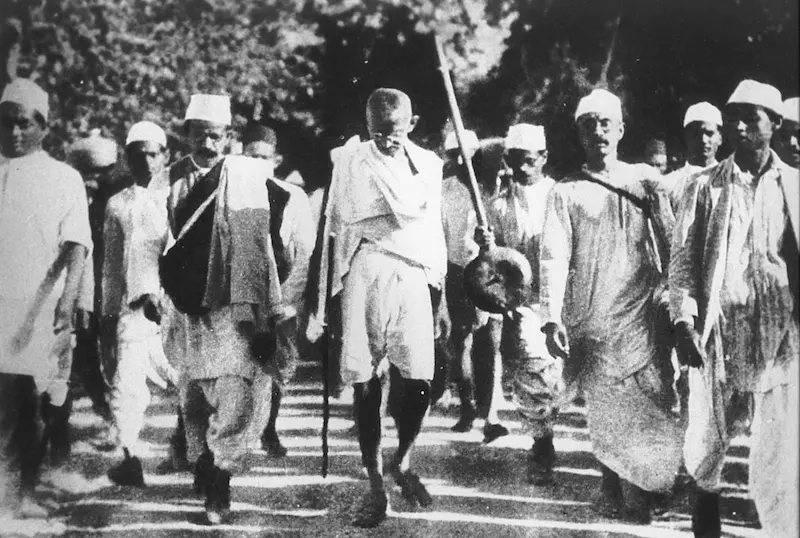If you are looking for an essay on Mahatma Gandhi, then you are at the right place. Mahatma Gandhi’s full name is Mohandas Karamchand Gandhi. He is also known as ‘Bapu’ or ‘Gandhiji‘. He played a key role in India’s independence movement through nonviolent civil disobedience. His philosophy of satyagraha or ‘truth force’ inspired millions around the world. If you are interested in learning more about Gandhi’s impact on Indian society and culture, you may also want to read a gangasagar mela essay, which explores the significance of the annual pilgrimage and festival in West Bengal.
He had a great personality. Gandhi encouraged Indian men and women to spin khadi clothes using charkha in support of the independence movement.
It was a way to boycott British cloth products and wear clothes made in India. Gandhiji is known for leading the Salt March, Quit India movement.
“A man is but a product of his thoughts. What he thinks he becomes.”
Mahatma Gandhi
Let’s start the essay.
10 lines on Mahatma Gandhi
- Mahatma Gandhi is called the ‘Father of the Nation’ in India.
- He was a great political leader. He was born on 2nd October 1869 at Porbandar.
- Kaba Gandhi and Putli Bai were his parents.
- He was very truthful from his childhood.
- He became a barrister from England. Then Gandhiji went to South Africa.
- There he fought against the British rulers. He then returned to India.
- He became a great leader in India’s freedom movement.
- Gandhiji was also a great man.
- He always felt for poor and untouchable people.
- Gandhiji was murdered on 30th January 1948. He did a lot for the peace, progress and prosperity of our country.
Essay On Mahatma Gandhi
Mahatma Gandhi, also known as Mohandas Karamchand Gandhi, is one of the most revered figures in the history of India. He played a pivotal role in leading India to independence from British rule through his principles of non-violence, civil disobedience, and the power of truth.
Gandhi’s life and teachings continue to inspire and influence people around the world, making him an iconic figure for students to study and learn from.
Gandhi was born on October 2, 1869, in Porbandar, a small coastal town in present-day Gujarat, India. From a young age, he displayed a strong sense of justice and a deep commitment to social issues. After completing his education in law in London, he embarked on a journey that would shape the course of his life and the destiny of a nation.
One of the most significant aspects of Gandhi’s philosophy was his unwavering belief in non-violence. He advocated for peaceful protests, emphasizing that violence only begets more violence and perpetuates a cycle of hatred.
Gandhi’s non-violent resistance, known as Satyagraha, encouraged Indians to confront injustice with courage, truth, and a willingness to endure suffering. Through his adherence to non-violence, he showed the world the power of peaceful resistance in achieving political and social change.
Gandhi’s leadership came to the forefront during India’s struggle for independence.
He led numerous movements and campaigns, including the famous Salt March in 1930, where he and his followers walked over 240 miles to protest the British monopoly on salt production. This act of civil disobedience ignited a spark across the country, galvanizing millions of Indians to join the fight for freedom.
Beyond political liberation, Gandhi also focused on social issues that plagued Indian society. He tirelessly worked to eradicate discrimination based on caste, promote gender equality, and improve the lives of the marginalized.
Gandhi believed that true independence could only be achieved by addressing the social and economic inequalities deeply ingrained in Indian society.
Gandhi’s teachings extend far beyond the borders of India. His principles of non-violence, truth, and self-discipline continue to inspire people around the world.
His influence can be seen in the civil rights movements led by Martin Luther King Jr. in the United States and Nelson Mandela in South Africa. Gandhi’s philosophy has transcended time and geography, leaving an indelible mark on the global stage.
For students, studying Mahatma Gandhi offers valuable lessons in leadership, courage, and the pursuit of truth. Gandhi’s life teaches us the importance of staying true to one’s values, even in the face of adversity.
His emphasis on self-discipline and self-improvement encourages students to cultivate their own moral character and strive for personal growth.
Moreover, Gandhi’s commitment to social justice and equality serves as a powerful reminder that individuals can bring about significant change through peaceful means.
Students can draw inspiration from Gandhi’s example and apply his teachings to address contemporary issues, such as climate change, human rights, and social inequality.
- Essay on Sharks For Students & Children - April 8, 2024
- Essay on Cats for Students (+PDF) - November 4, 2023
- Essay on Carpenter|10 Lines on Carpenter - November 4, 2023


